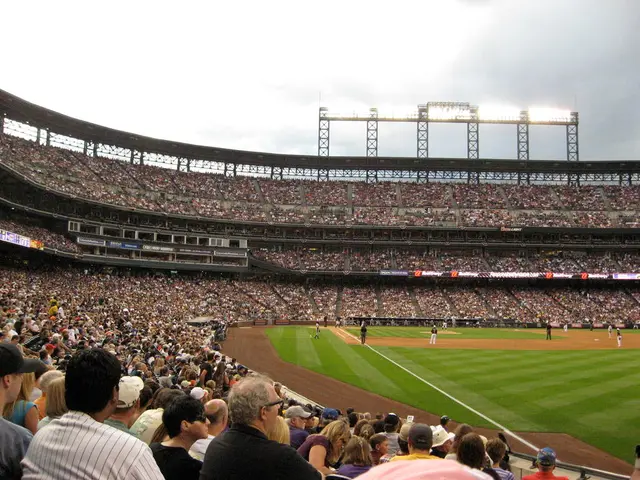Venezuelan Government Criticizes "Recurring U.S. Aggression" and Contemplates Spain Diplomatic Ties
Title: US Throws More Sanctions at Venezuela, Sparking Diplomatic Feuds
September 14, 2024 (our website) - The Maduro government in Venezuela has lashed out at the US for imposing fresh individual sanctions on high-ranking Venezuelan officials.
"Venezuela vehemently denounces this latest escalation, with the application of arbitrary, illegitimate, and illicit coercive actions against government officials," a statement issued on Thursday stormed. Caracas deemed the measures as a clear indication of the US' "disregard for international law."
The Maduro administration went on the offensive, accusing the US of trying to impose regime change and vowed that the "Venezuelan people's dignity" would thwart destabilization attempts.
Earlier in the day, the US Treasury's Office of Foreign Assets Control (OFAC) slapped sanctions on 16 top Venezuelan figures from judicial, security, and electoral bodies. The sanctions were initiated on allegations that they obstructed a free and fair presidential election in the Caribbean nation.
"The United States is taking robust action against Maduro and his cronies for their suppression of the Venezuelan people and denial of their right to a free election," Deputy Secretary of the Treasury Wally Adeyemo declared.
Among the sanctioned officials were Supreme Court (TSJ) President Caryslia Rodríguez, four other TSJ justices, prosecutor Luis Dueñez, judge Edward Briceño, National Electoral Council (CNE) Rector Rosalba Gil, Armed Forces Commander Domingo Hernández, and National Assembly Vice President Pedro Infante.
From this point forward, the blacklisted individuals are prohibited from entering the US and will see any assets held in US territory frozen. The US Treasury Department has now sanctioned over 140 Venezuelan officials.
Apart from targeted sanctions, Washington has also imposed sectoral coercive measures against Venezuelan banks, mining enterprises, and specifically the oil industry. Analysts and multilateral organizations have criticized the blockade's detrimental effects on the Venezuelan economy and human rights impact.
The latest round of sanctions followed the Biden administration's support for the hardline opposition's victory claims in the July 28 presidential elections.
The CNE announced Maduro as the winner with 52 percent of the vote. The results were later confirmed following a Supreme Court review, with Maduro set to remain in office through January 10, 2031. Nevertheless, the CNE did not release its usual broken-down voting totals.
The Venezuelan opposition, led by far-right María Corina Machado, refused to acknowledge the outcome and published a claimed set of electoral tallies online, showing González winning in a landslide.
The US and regional allies, including Argentina and Chile, have backed the opposition's stance and rejected the official results. In contrast, Russia, China, and other Latin American countries aligned in the ALBA alliance have congratulated Maduro on reelection and denounced foreign meddling in Venezuelan affairs.
Tension Rising between Caracas and Madrid
The aftermath of the July 28 vote has led to strained relations between Venezuela and Spain.
On Friday, Venezuelan Foreign Minister Yván Gil announced the recall of ambassador to Spain Gladys Gutiérrez for consultations. He later summoned Spanish ambassador to Venezuela Ramón Santos Martínez for a meeting on Friday afternoon.
Via social media, Gil revealed that he warned the Spanish representative that Caracas would not tolerate "interference" from Madrid and would protect its sovereignty in accordance with international law.
The latest clash stemmed from comments by Spanish Defense Minister Margarita Robles, who referred to the Latin American nation as a "dictatorship."
Earlier in the week, the Venezuelan National Assembly also questioned diplomatic relations with Spain, with the parliament's President Jorge Rodríguez urging the government to sever all ties with the European country, including economic ties and air travel.
Rodríguez's plea responded to a symbolic vote whereby the Spanish Congress of Deputies recognized González as the winner of Venezuela's election and requested that the Pedro Sánchez government do the same.
For his part, Sánchez declared his administration would disregard the petition and adhere to the common European Union position. According to EU foreign policy chief Josep Borrell, the body flatly refuses to accept the results without a "transparent verification" of electoral records.
The deterioration of relations comes in the wake of González's departure to Spain. Despite the existence of an arrest warrant on charges of usurpation of functions and forgery, the Maduro government granted the former diplomat safe passage to flee the country.
- The Venezuelan government, in response to US sanctions, denounced the actions and stated they disregard international law, staging a diplomatic confrontation.
- The Maduro administration in Venezuela accused the US of trying to impose regime change and maintain the people's dignity to thwart destabilization attempts.
- Sanctions on 16 high-ranking Venezuelan officials were announced by the US Treasury's Office of Foreign Assets Control (OFAC) for obstructing a fair presidential election in Venezuela.
- The diplomatic ties between Venezuela and Spain have become strained due to comments from Spanish Defense Minister Margarita Robles, who referred to Venezuela as a "dictatorship."
- Venezuelan Foreign Minister Yván Gil recalled the ambassador to Spain for consultations and summoned the Spanish ambassador for a meeting, indicating that Caracas would not tolerate interference from Madrid and would protect its sovereignty.
- The deterioration of relations between the two nations also involved a symbolic vote by the Spanish Congress of Deputies, recognizing González as the winner of Venezuela's election and requesting that the Pedro Sánchez government do the same.
- The Venezuelan opposition, in response to the election results, has protested and published a claimed set of electoral tallies online, rejecting the official results and accusing the Maduro government of fraud.








